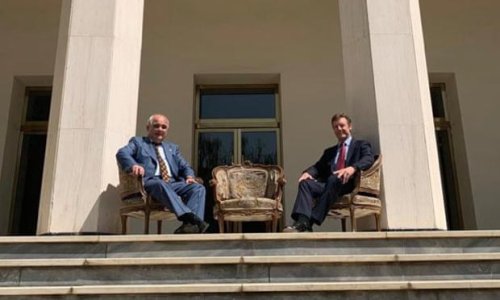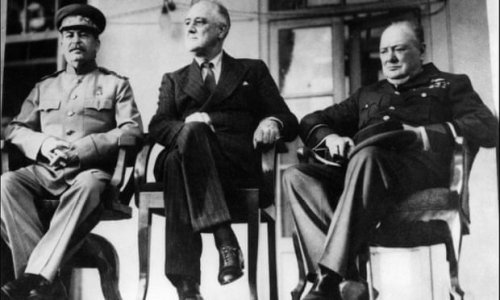World powers attempting to revive the Iran nuclear deal have warned of complications on the path to an agreement as they met for the first time since the election as Iranian president of Ebrahim Raisi, a hardline conservative cleric deeply antagonistic towards the west.
Jake Sullivan, the US national security adviser, said the arrow was pointing in the right direction, but he refused to say if sanctions imposed on Raisi by the Trump administration would be lifted. The German government’s human rights commissioner, Bärbel Kofler, said it was concerning that Raisi had not distanced himself clearly from human rights abuses. A European diplomat meanwhile warned the talks could not be open-ended, hinting strongly they needed a deal before Raisi took power in early August.
Israel – which was not at the talks – led opposition, denouncing the incoming government as a “regime of brutal hangmen” in reference to Raisi’s involvement in mass executions in 1988, and predicting it would be a pawn in the hands of the supreme leader, Ali Khamenei.
“Raisi’s election is, I would say, the last chance for world powers to wake up before returning to the nuclear agreement, and understand who they are doing business with,” said the new Israeli prime minister, Naftali Bennett. “A regime of brutal hangmen must never be allowed to have weapons of mass destruction. Israel’s position will not change on this.”
Senior diplomats from China, Germany, the UK, France and Russia will now return to their capitals for consultations after meeting in Vienna to take stock of developments on the 2015 deal. The US pulled out under Trump but the Biden White House has said it will rejoin under terms that will broadly mean it scales back sanctions if Iran will return to its original commitments on issues such as uranium enrichment, which it has since breached.
Iranian diplomats, including the foreign minister, Javad Zarif, insist they have the same negotiating mandate as before and say a deal could be reached well before Raisi takes power in early August, since none of the remaining obstacles are insurmountable. Raisi himself said in the election campaign that he supported the deal.
Sullivan played down Raisi’s significance to the talks in Vienna. “The ultimate decision for whether or not to go back into the deal lies with Iran’s supreme leader, and he was the same person before this election as he is after the election,” he told ABC News.
Some western diplomats claim Iran was stalling in the months-long talks to ensure the outgoing reformist government could not claim credit for restoring the deal and lifting US sanctions ahead of the election. These diplomats claim that with the reformists now vanquished inside Iran, the revived deal can be agreed upon rapidly.
But others claim the same difficult issues remain unresolved, including how the US can guarantee it will not leave the deal again, how Iran handles the knowledge and assets it has developed while in breach of the deal’s terms, how long the hardline Iranian parliament can legitimately delay Iran complying with the deal’s terms until it is satisfied US sanctions have been lifted, and finally the precise basket of US sanctions that will be lifted. The US on Friday lifted some sanctions to allow humanitarian food and medicines to reach the country.
Iranian conservatives have furthermore called the original nuclear deal “a stinking corpse” and “a national humiliation”, so they will have to execute a delicate political pirouette to claim a restart of the deal as a political triumph.
Trump took the US out of the deal in 2018, imposing maximum economic sanctions on Iran, politically torpedoing the reformist government led by Hassan Rouhani, in part creating the context for Raisi to win the election.
Raisi, 60, the head of the judiciary, won a landslide victory with 18m votes in a contest in which serious rivals were blocked from standing, but his mandate was weakened by a collapse in the numbers of people voting. The true turnout may be closer to 43%, rather than the official 48%, which was already the lowest recorded in the history of the Islamic republic.
Votes cast included 4m spoiled ballot papers, far above the normal rate and suggesting a conscious decision by large numbers of Iranians to go to the polls to register their protest at the regime and the limited choice on the ballot paper – bringing the proportion of Iranians who voted for a candidate down by as many as five percentage points.
Turnout in the capital, Tehran, was a paltry 26%, and in Shiraz just over 30%. In Tehran province, 12% of the votes cast were invalid. Nationwide turnout in 2017, by contrast, was 73.3% and in 2013 72.9%.
The result has led to a bitter inquest on social media among reformists about the wisdom of some, such as Behzad Nabavi, , throwing their weight behind the head of the central bank, Abdolnasser Hemmati, in the absence of a true reformist candidate. He ended up placed fourth, behind spoiled ballot papers and another conservative.
Some of the older generation had backed Hemmati at the last moment, while the reformist umbrella group split 50/50 on whether to support a man that had little wide political experience, was unpopular due to his tenure at the central bank and, surprisingly, did not set out a clear economic plan, the issue on which the election was mostly likely to turn. At the time of his semi-endorsement by the reformists, the polls were showing Hemmati had no chance of winning, at 3.6% in the polls.
Many said the debacle with Hemmati marked the death knell of a certain generation of reformists who believe that the elected government can achieve change without confronting the powerful conservative unelected state led by Khamenei.
The US said Iranians had been denied a democratic election, pointing out that all prominent reformists were disqualified as candidates by the 12-strong Guardian Council.
In a sign of the limits of some reformists, Zarif said he was disappointed and surprised by the disqualifications, but accepted the legitimacy of Raisi as president.
Raisi, who campaigned as an opponent of corruption, has the task of constructing an economic programme, a cabinet, including a new foreign minister and head of the judiciary, as well as allaying the threat of yet another wave of coronavirus sweeping the country.
Human rights activists were dismayed by his election. The head of Amnesty, Agnès Callamard, called for Raisi’s prosecution for his role in the killing of thousands of detained MEK prisoners in 1988. Iran regarded the MEK as a terrorist group that was seeking to overthrow the regime, but leading figures in the regime at the time privately condemned the extrajudicial killings. Raisi was a member of the death committee that sent thousands to be shot or hanged.









